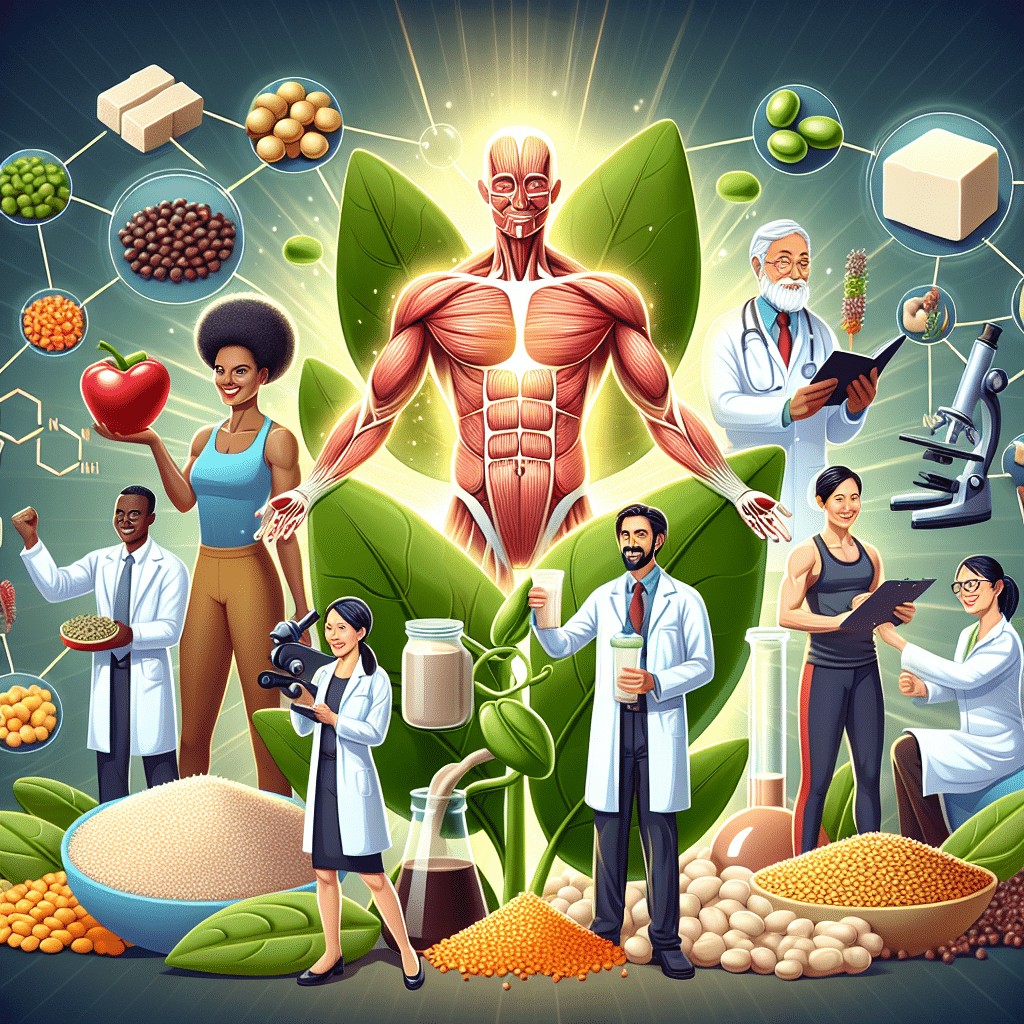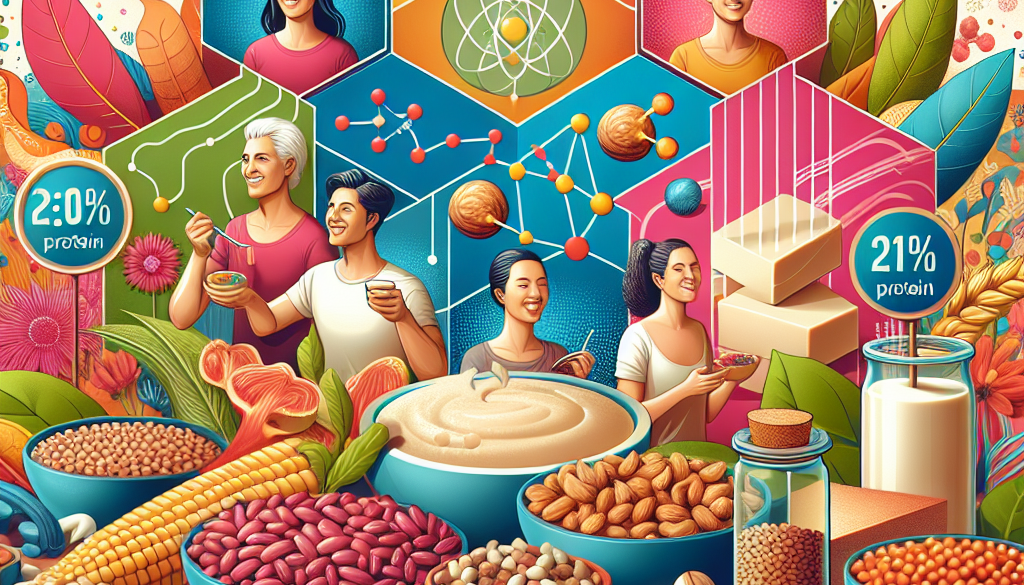The Vital Role of Alternative Proteins in Human Health
-
Table of Contents
- Alternative Proteins: Essential for Optimal Human Health
- The Nutritional Importance of Protein
- Environmental and Ethical Considerations
- Health Benefits of Alternative Proteins
- Types of Alternative Proteins
- Challenges and Considerations
- Statistics Supporting the Shift to Alternative Proteins
- Conclusion
- Discover ETprotein’s Range of High-Quality Alternative Proteins
Alternative Proteins: Essential for Optimal Human Health

The global population is on the rise, and with it, the demand for protein, a macronutrient vital for human health, is also increasing. Traditional sources of protein, primarily from animal-based products, are not sustainable at the scale required to feed the growing population. This has led to a surge in interest and research into alternative proteins. These proteins, derived from plants, insects, algae, and lab-grown sources, are not just a trend; they play a crucial role in nutrition, environmental sustainability, and global health.
The Nutritional Importance of Protein
Proteins are the building blocks of life, essential for the growth and repair of tissues, and they play a critical role in various bodily functions. Amino acids, the components of proteins, are necessary for:
- Muscle development and maintenance
- Immune system function
- Hormone and enzyme production
- Overall cellular health
While animal proteins provide all essential amino acids, alternative proteins can also fulfill these nutritional requirements when consumed in a well-balanced diet.
Environmental and Ethical Considerations
The production of animal-based proteins is resource-intensive, contributing to deforestation, water scarcity, and greenhouse gas emissions. In contrast, alternative proteins generally have a lower environmental footprint. For instance:
- Plant-based proteins require less land and water than livestock farming.
- Cultured meat production could potentially reduce energy consumption by up to 45% compared to traditional beef production.
- Insect farming emits significantly fewer greenhouse gases and can be done using organic waste.
Moreover, alternative proteins offer solutions to ethical concerns surrounding animal welfare in the food industry.
Health Benefits of Alternative Proteins
Alternative proteins are not just environmentally friendly; they also offer numerous health benefits:
- Lower in saturated fats and cholesterol, reducing the risk of heart disease.
- High in fiber and phytonutrients, which are beneficial for gut health and may reduce the risk of certain cancers.
- Free from antibiotics and hormones often used in animal farming, leading to a lower risk of antibiotic resistance and hormone-related health issues.
Types of Alternative Proteins
There are several sources of alternative proteins, each with unique benefits:
- Plant-Based Proteins: Derived from beans, lentils, nuts, seeds, and whole grains. They are rich in fiber and essential nutrients.
- Insect Proteins: Insects like crickets and mealworms are high in protein and can be farmed sustainably.
- Algal Proteins: Sourced from algae, these proteins are rich in omega-3 fatty acids and antioxidants.
- Cultured or Lab-Grown Proteins: Produced through cellular agriculture, they mimic the taste and texture of animal proteins without the need for farming animals.
Challenges and Considerations
Despite the benefits, there are challenges to the widespread adoption of alternative proteins:
- Consumer acceptance and taste preferences.
- Nutritional profile and amino acid composition.
- Economic viability and scalability of production.
- Regulatory hurdles and food safety concerns.
Research and innovation are key to overcoming these challenges and making alternative proteins a staple in diets worldwide.
Statistics Supporting the Shift to Alternative Proteins
Recent studies and market analyses highlight the growing importance of alternative proteins:
- The alternative protein market is projected to reach $17.9 billion by 2025.
- Plant-based meat sales in the U.S. grew by 27% in 2020, outpacing conventional meat sales.
- 68% of Americans are willing to try protein alternatives to meat.
These statistics indicate a significant shift in consumer behavior and market potential for alternative proteins.
Conclusion
Alternative proteins are more than just a passing trend; they are vital for the future of human health, environmental sustainability, and ethical food production. By incorporating a variety of protein sources into our diets, we can meet our nutritional needs while also addressing the pressing issues of climate change and food security. As research continues to advance, alternative proteins are set to become an integral part of our global food system.
Discover ETprotein’s Range of High-Quality Alternative Proteins
If you’re looking to incorporate alternative proteins into your diet or product offerings, ETprotein is your go-to source. With a wide range of organic bulk vegan proteins and L-(+)-Ergothioneine, ETprotein ensures you have access to the highest quality ingredients for your nutritional needs. Their products, including organic rice protein, pea protein, and various seed proteins, are characterized by a neutral taste, non-GMO, and allergen-free attributes. Catering to industries such as nutraceuticals, pharmaceuticals, and food and beverage, ETprotein is a trusted supplier for leading global brands. To explore their offerings and sample their products, contact sales(at)ETprotein.com today.
About ETprotein:
ETprotein, a reputable protein and L-(+)-Ergothioneine (EGT) Chinese factory manufacturer and supplier, is renowned for producing, stocking, exporting, and delivering the highest quality organic bulk vegan proteins and L-(+)-Ergothioneine. They include Organic rice protein, clear rice protein, pea protein, clear pea protein, watermelon seed protein, pumpkin seed protein, sunflower seed protein, mung bean protein, peanut protein, and L-(+)-Ergothioneine EGT Pharmaceutical grade, L-(+)-Ergothioneine EGT food grade, L-(+)-Ergothioneine EGT cosmetic grade, L-(+)-Ergothioneine EGT reference grade and L-(+)-Ergothioneine EGT standard. Their offerings, characterized by a neutral taste, non-GMO, allergen-free attributes, with L-(+)-Ergothioneine purity over 98%, 99%, cater to a diverse range of industries. They serve nutraceutical, pharmaceutical, cosmeceutical, veterinary, as well as food and beverage finished product distributors, traders, and manufacturers across Europe, USA, Canada, Australia, Thailand, Japan, Korea, Brazil, and Chile, among others.
ETprotein specialization includes exporting and delivering tailor-made protein powder and finished nutritional supplements. Their extensive product range covers sectors like Food and Beverage, Sports Nutrition, Weight Management, Dietary Supplements, Health and Wellness Products, and Infant Formula, ensuring comprehensive solutions to meet all your protein needs.
As a trusted company by leading global food and beverage brands and Fortune 500 companies, ETprotein reinforces China’s reputation in the global arena. For more information or to sample their products, please contact them and email sales(at)ETprotein.com today.














